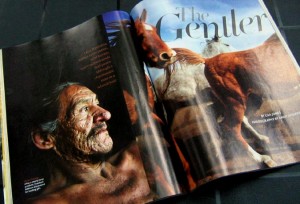 The flight attendant had just demo’ed seat belts and was reaching for the sample life jacket when I pulled the May issue of Spirit magazine from the seat-back pocket in front of me. Soon after takeoff I came upon a double-page spread: a craggy man in a shadowy photo, some wild horses–what’s not to like? I settled in for what I thought would be another mildly entertaining first-person story on my way to Phoenix.
The flight attendant had just demo’ed seat belts and was reaching for the sample life jacket when I pulled the May issue of Spirit magazine from the seat-back pocket in front of me. Soon after takeoff I came upon a double-page spread: a craggy man in a shadowy photo, some wild horses–what’s not to like? I settled in for what I thought would be another mildly entertaining first-person story on my way to Phoenix.
Boy, was I wrong.
The day I met Stanford Addison, I sat with him outside his corral watching the horse inside it try to escape. First she got down on her belly like a cat and tried to crawl under the pole fence. . . . Then she ran around and around, squealing her disapproval of her new surroundings. . . . I didn’t know much about horses, but it struck me as strange that she would make a point of stopping right there in front of Stanford. She tossed and whinnied in what started to look to me like an appeal. Stanford watched until he was certain she was finished. Then he said in a low voice, “I can’t save you.”
A man talking softly to a frightened animal was a good start. That the man was sitting in an electric wheelchair added interest. I read on. The man had been in a car accident at twenty and a quadriplegic for two decades since.
Along with his physical paralysis had come some powerful healing gifts. At first both his disability and these gifts seemed a terrible burden, but he came to understand that he had emerged from a small life into a big one. He had broken, broken through, broken out. His body was changed forever, but so was his heart. This happened in different ways to a lot of people around Stanford. I had no idea that first time I visited him and watched his curious dialogue with the mare, that the same thing would happen to me.
Now I was committed. Hearts breaking open is not the usual fare of in-flight magazines.
The writer, I read, was on assignment for Smithsonian to write a profile of Stanford Addison, a Northern Arapaho horse gentler and community healer from the Wind River Indian Reservation in Wyoming. But the morning she met him, she said, her eyes didn’t know where to look.
My gaze skittered to the dirt beneath the wheels [of his chair], to the sky above his head, to anywhere else, and irresistibly back to him. His motionless feet were covered in bright white ankle socks that had clearly never touched the ground. His legs protruded, sticklike, from nylon shorts. Acne scars dotted his shoulders. His arms tapered to long, graceful hands. His face was pockmarked and thin. I had never seen bad luck heaped so hugely upon a human body. I was bristling with discomfort. He wasn’t. He looked at me, his gaze mild, open, alert, and unblinking. It walloped me just the way beauty would. I blushed to the roots of my hair. It felt like he could see every little place in me that had gone hard and rigid.
My pulse, I noticed, was pumping harder than it needed to. Strapped into my plane seat, on my way to Phoenix for the thirtieth time in seven years, I was dumbfounded. In all those trips, I had never read writing like this in an airline rag.
The writing walloped me. It took me to the place where truthful writing takes us, snapping off a brittle corner or two of my heart so a softer center can flow.
The story continued: The writer’s fear of horses, how she tried and failed to get through to one black stallion. How Stanford seemed to reach past her fear to pull out the courage moving behind it. How she emerged from the fear to finally see the horse as he was—a being who was at least as frightened as she, who would respond, as she would, to gentle nudging and support.
[Stanford’s] gentleness was so foreign to my system that it took me a while to figure out what it was. And he wasn’t gentle only with me and the stallion. He was gentle with the dogs, the children, and the other spectators. . . .
Stanford gentled us. All of us. He gentled us along.
I didn’t know just how deeply I was moved until we landed in Phoenix. Sitting in an airport restaurant, I found myself noticing, one by one, other travelers. A curly-haired woman with a worried furrow between her eyes. A white middle-aged man at the next table talking business strategy. A young brown-skinned woman sweeping crumbs into a scooper on the floor. Each of them precious beyond words. Each one indispensable to the whole. I saw each one through soft eyes, my heart opening to their struggles and their hopes.
It was a piece of magic brought about by a piece of good writing, and it lasted, like a nimbus slowly fading, for several hours after leaving the plane.
But who was this writer who had worked this magic? I soon found out my good fortune: Lisa Jones lives in my town, she’s the friend of some writer-women friends, and this week she gave a reading at the Boulder Bookstore.
Turns out, the magazine story was excerpted from Lisa’s book, which just came out: Broken: A Love Story, about the four years she spent visiting the reservation and writing Stanford’s story. I bought the book, of course, and am stealing moments outside of grading theses and holding end-of-semester conference calls to enjoy it.
In person, Lisa is just as engaging as on the page. During her reading she talked about Indian-white relations and about how she changed through working on this book.
I went to the reservation to watch Stanford work, but a lot of what I ended up watching was what was going on inside of me. I’ve softened up a lot. I feel a lot more connected to things.
Update June 9: Lisa Jones just posted this video of readings from the book, plus photos from Wind River and Stan singing. Enjoy!
Priscilla,
Thank you for sharing these excerpts and your response. Both were beautiful and “gentling” at the end of a long day.
Priscilla, your dissection of what happened inside you as you read Lisa’s words is a moving testament to the power of honest writing. Thanks for spreading word of this wonderful book in your own well-crafted prose.
Thank you for this wonderful expression of appreciation for Lisa’s book. As a writer, I cannot imagine a more important thing to discover than that someone reading my work was deeply touched and fully engaged. I can’t wait to read this book–I’ve heard many fine things about the writing and the story.
Kudos to Southwest for picking this up. There was also an excerpt of Jones’ book in High Country News recently:
http://www.hcn.org/issues/41.7/got-warriors
If you like GOOD writing about the West, there’s no better place to find it than HCN.
Priscilla,
My friend just sent me a link to your blog, and to your post about my book. Reading it was like Christmas morning. I am SO HAPPY you liked BROKEN: A Love Story so much! And it was great to meet you at the reading. I just scrolled around in your blog and really enjoyed your photos of Chatauqua. I was just up there today and it blew me away. What an amazing time of year.
All the best,
Lisa Jones
I loved the quote you chose from the book when Lisa first encounters Stanford–so much goodness buried under so much “ugliness.” And I loved your reaction after reading the excerpt: how you felt it opened your heart. This is inspiring.
Thanks, everyone, for your comments. Lisa, great to see you here! Hope to meet you again in Boulder. Good wishes with all your travel and readings.
Touching! I need to buy this book and read it! I’ve seen it mentioned in so many places–High Country News, for one–and that’s a sure sign that it’s calling to me.
Thanks for sharing your responses to Lisa Jones’s beautiful writing. I think the phrase that resonated for me most is: “He had broken, broken through, broken out.” I just copyedited a book on shamanism, and one element of shamanistic work (or shamans themselves) is that you undergo physical breaking such as a sickness or accident before coming out on the other side. Clearly, Lisa Jones is using words as a sort of shamanistic healing for everyone who reads about Stanford’s healing and quieting abilities.